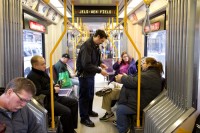TriMet has taken a harsher stance against riders caught without valid fare. Moving from a policy of education to one of enforcement has resulted in a nearly sevenfold increase in $175 citations since July 2011.
On Dec. 13, TriMet released a Fare Enforcement Report, which compared the number of warnings, citations and exclusions issued by TriMet for 2010 and 2011. In September of 2010, TriMet gave 1,128 warnings, 198 citations and 430 exclusions. In comparison, during September 2011 only 487 warnings were given, but 2,028 citations and 563 exclusions were issued.

TriMet has stated that riders now have an 83 percent chance of being issued a citation or being expelled from the service vehicle if they are found to be without valid fare. This is a dramatic increase from one year ago when the odds of receiving a ticket were roughly 35 percent.
There has been a recent surge in ticketing, which Mary Fetsch, chief media relations officer for TriMet, said stems largely from public criticism that too many people were subverting the system.
“When General Manager Neil McFarlane went out and met with the community throughout his first year on the job, he would hear from people who said, ‘[TriMet] has a lot of challenges and financial issues, you should do everything you can do get as much out of the fares as possible,’” Fetsch said.
The move toward a harsher enforcement policy also derives from the transportation agency’s projected $12–17 million budget shortfall for next year.
“As we are going through our budget process for next year, we’re seeing some trends that are quite worrisome,” Fetsch commented. “Obviously we are in tough budget times, so the harsher policy is bringing in new revenue, but it also sends the message that you have to pay your fare.”
Health sciences junior Erin Conlon rides the MAX three times per week and agreed with TriMet’s decision. “I think a crackdown is fair. Overall, I think it is a good system,” Conlon said.
Although Conlon believed that the harsher policy on fare enforcement was beneficial, she thought that the $175 citation was rather high and “didn’t seem to fit the crime” of fare-dodging.
“This is really an open system, which it was meant to be, and it’s based on the honor system,” Fetsch said. She compared fare-dodging to walking out of a grocery store without paying for your items. “Just because it’s an open system doesn’t mean you don’t have to pay your fare.”
The harsher policy on fare enforcement still leaves room for exceptions. TriMet inspectors are still given discretion to ticket riders as they see fit; exceptions might be made for tourists or for instances of a malfunctioning ticket machine. However, inspectors are able to instantly check if a rider has already been issued a warning, and whether or not a specific ticket machine is fully functional.
Citation revenue is split between TriMet, Multnomah County and the state of Oregon. Up to $69 goes back to the TriMet general fund, depending on whether the ticketed person takes TriMet to court to challenge the citation. The remaining $106 is allocated to Multnomah County and the state of Oregon.
TriMet has estimated that an additional $460,000 of revenue will be generated from more riders buying fares. Fetsch said that last year TriMet received around $100,000 in citation revenue, but that was before the harsher fare policy had been instituted. She also stated that this extra money will be used to help cover the cost of the six additional TriMet supervisors hired to aid fare enforcement.
These new hires, combined with existing TriMet employees who dedicate one hour of their shift to enforcing fares, has brought the total number of inspectors up to the equivalent of 18 full-time fare enforcers.
In addition to cracking down on fare enforcement, TriMet also plans to hire four more transit police officers, including two K-9 units, by way of a $1.5 million federal grant given by the Transportation Security Administration under the Department of Homeland Security.
“Over the years, [the TSA] has given us several grants, where we have expanded our staff and added security cameras to platforms,” Fetsch said.
The addition of new officers will bring the total number of transit police to 62 officers. The transit police division is made up of about 17 different jurisdictions that assign officers to the transit system.

